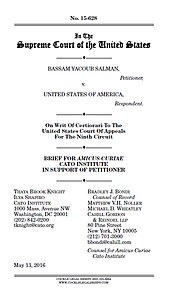The Cato Institute has filed an amicus brief in Salman v. U.S. aimed at limiting the reach of just such an ill-defined, judicially-created law. Insider trading is a crime that can put a person away for more than a decade, and yet this crime is judge-made and as such is ever-changing. Although individuals may know generally what is prohibited, the exact contours of the crime have remained shrouded, creating traps for the unwary.
The courts, in creating this crime, have relied on a section of the securities laws that prohibits the use of “any manipulative or deceptive device or contrivance” in connection with the purchase or sale of a security. The courts’ rationale has been that, by trading on information belonging to the company, and in violation of a position of trust, the trader has committed a fraud. The law, however, says nothing of “insiders” or “insider trading.” And yet in 2015 alone the Securities and Exchange Commission (SEC) charged 87 individuals with “insider trading” violations.
Broadly speaking, insider trading occurs when someone uses a position of trust to gain information about a company and later trades on that company, without permission, to receive a personal benefit. But what constitutes a “benefit”? The law doesn’t say.
Left to their own devices, the SEC has pushed the boundaries of what constitutes a “benefit,” making it more and more difficult for people to know when they are breaking the law. In the case currently before the Court, Bassam Salman was charged with trading on information he received from his future brother-in-law, Mounir Kara, who had in turn received the information from his own brother, Maher. The government has never alleged that Maher Kara received anything at all from either his brother or Salman in exchange for the information. The government has instead claimed that the simple familial affection the men feel for each other is the “benefit.” Salman’s trade was illegal because he happens to love the brothers-in-law who gave him the inside information.
Under this rationale, a person who trades on information received while making idle talk in a grocery line would be safe from prosecution while the same person trading on the same information heard at a family meal would be guilty of a felony. Or maybe not. After all, if we construe “benefit” this broadly, why not say that whiling away time chit-chatting in line is a “benefit”?
No one should stumble blindly into a felony. We hope the Court will take this opportunity to clarify the law and return it to its legislative foundation. Anything else courts tyranny.


